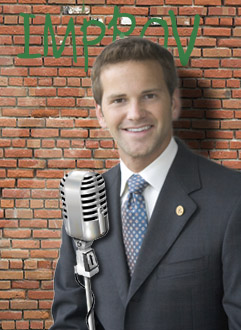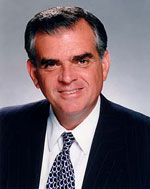The Peoria Area World Affairs Council sponsored a foreign policy debate with the three Republican candidates for the 18th Congressional District seat being vacated by Ray LaHood. It was broadcast live on WCBU (you can hear the debate in its entirety by clicking here), and was moderated by Jonathan Ahl. The questioners were Ahl, Illinois Central College President John Irwin, and Peoria Journal Star editorial writer Mike Bailey.
I finally got around to listening to the whole debate Sunday evening. The only way I could stay awake through the whole thing was by taking notes and eating Fritos. The notes came in handy afterwards, however, when I was trying to decide who won the debate. I developed a little scoring system and rated each of the answers, then summed the scores to see who came out on top. To my surprise, it was McConoughey.
It was a surprise to me because McConoughey is not a very effective speaker. I don’t mean that as an insult. He’s just kind of quiet and doesn’t come across on radio as particularly engaging like Morris or Schock. His opponents have a lot better delivery and poise. But when that was stripped away and I looked at what each of them had to say in response to the questions asked, I thought McConoughey came out on top overall. Schock came in second, and Morris last.
Naturally, each candidate had his pluses and minuses. One of Morris’s best answers was in response to Jonathan Ahl’s question about whether there comes a time when the U.S. should decide that democracy isn’t possible in a given country. Morris responded that he believes, like the Declaration of Independence says, that all men — not just Americans — are endowed by their Creator with certain unalienable rights, and that freedom is the destiny of the world. He also had good responses to questions regarding immigration and determining the accuracy of intelligence information.
But as the debate went on, Morris became less and less effective. His answers on Taiwan, Canada, and Lebanon were all weak — meaning he didn’t really answer the questions posed. He’s for free trade to a fault; he favors limiting trade only in “extraordinary circumstances,” such as “hot war” and “gross violations” of trade agreements. Only McConoughey cited human rights violations as a trigger for restricting trade. Finally, several of Morris’s answers bordered on jingoism (some questions were answered with nothing more than “I’m an American” and “I will vote in America’s best interests”).
Schock had a terrific answer to Bailey’s question about immigration — the one where he asked how the candidates reconciled their immigration stance with their family/religious values. He said, “God is a God of order,” and “Locking your door at your home and requiring that someone get permission to enter before coming into your house does not make you a bad neighbor.” An apt analogy. He also had the best answer as to how the U.S. can improve its relationship with Lebanon, which was to deal head-on with the Hezbollah problem and its Iranian funding.
Some of Schock’s answers, coupled with other statements he’s made, gave me the impression that he’s been reading up on former president Reagan and sometimes gets the past confused with the present. One example is his infamous suggestion (now retracted) that we sell Pershing missiles to Taiwan, even though Pershing missiles were destroyed by the early 1990s. In this debate, he evaded Ahl’s question about whether democracy is possible in some countries by talking about U.S. missteps toward Iran in the 1970s. A curious reference.
The only questions McConoughey didn’t have a good answer for were Ahl’s question on what the U.S. needs to do for Canada on issues such as sovereignty of the Arctic Ocean and air pollution from midwest coal-burning plants and Bailey’s question about ideas to promote peace between Israel and the Palestinians. However, none of the candidates had good answers to those questions. McConoughey’s “new” idea on the Israeli-Palestinian conflict was using Turkey as an intermediary to try to negotiate peace, but in fact Turkey is already a partner in that effort.
On the rest of the questions, however, McConoughey did well, showing a good understanding of our economic ties to other countries (including Canada), how to strengthen the dollar, and free trade theory.

 Remember
Remember  “To make a statement that you’re going to arm one country with nuclear weapons to attack China I think shows a fairly high level of not doing your homework, and … immaturity and not using good political sense.”
“To make a statement that you’re going to arm one country with nuclear weapons to attack China I think shows a fairly high level of not doing your homework, and … immaturity and not using good political sense.”